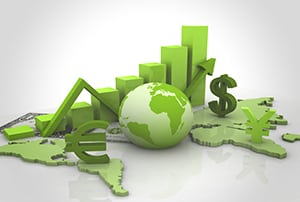A brave new world order may be emerging almost unnoticed as an economic power shift is taking place, according to an investment expert.
The trigger was the recent agreement between BRICS countries to set up a new development bank and $100 million currency fund.
The BRICS countries – Brazil, Russia, India, China and South Africa – have pledged to work together, but the move could signal the sun setting on the United States dominance of the world economy.
The observation comes from Invesco Perpetual head of emerging markets equities Dean Newman.
He argues that the US and New York have been at the centre of the world economy since the end of the Second World War, but everything could be about to change.
New voice in global economics
The BRICS economies combined make up more than 25% of the world’s GDP and represent a significant economic force.
However, their voting rights in global financial institutions like the World Bank and International Monetary Fund lag their behind their economic clout. Hence, they are breaking away to form their own banking club.
“These countries want and deserve a voice in global politics, but the institutions that oversee the world economy always seem to have a European or American at the helm,” said Newman.
“Now, the chair of the new bank will revolve between each country and they will have a massive fund to bolster their economies. The world needs to start listening to what they have to say.”
Newman also expects other developing countries to join the BRICS banner as a common complaint is the strings attached to IMF or World Bank loans are too strict.
“The shift has not moved the other way yet, but it’s started and we could see less dominance for the US and Europe in the world economy as a result,” he said.
Triple dip recession
Italy is in triple dip recession after reporting negative growth in consecutive quarters for the third time since 2007, said Azad Zangana, European economist at investment house Schroders.
The economy has contracted by 0.3% in the first half of 2014, although growth of a moderate 0.1% was predicted.
Zangana suggests the government has dropped the ball on the economy by spending too much time on internal political conflicts.
“Spain has the same economic problems but posted impressive growth of 0.7% in the second quarter,” he said. “Italy and France have both resisted taking action to control their economies and are suffering as a result, acting like a millstone on the rest of the Eurozone.
“AS two of the largest Eurozone economies, they should be acting with more responsibility.”
